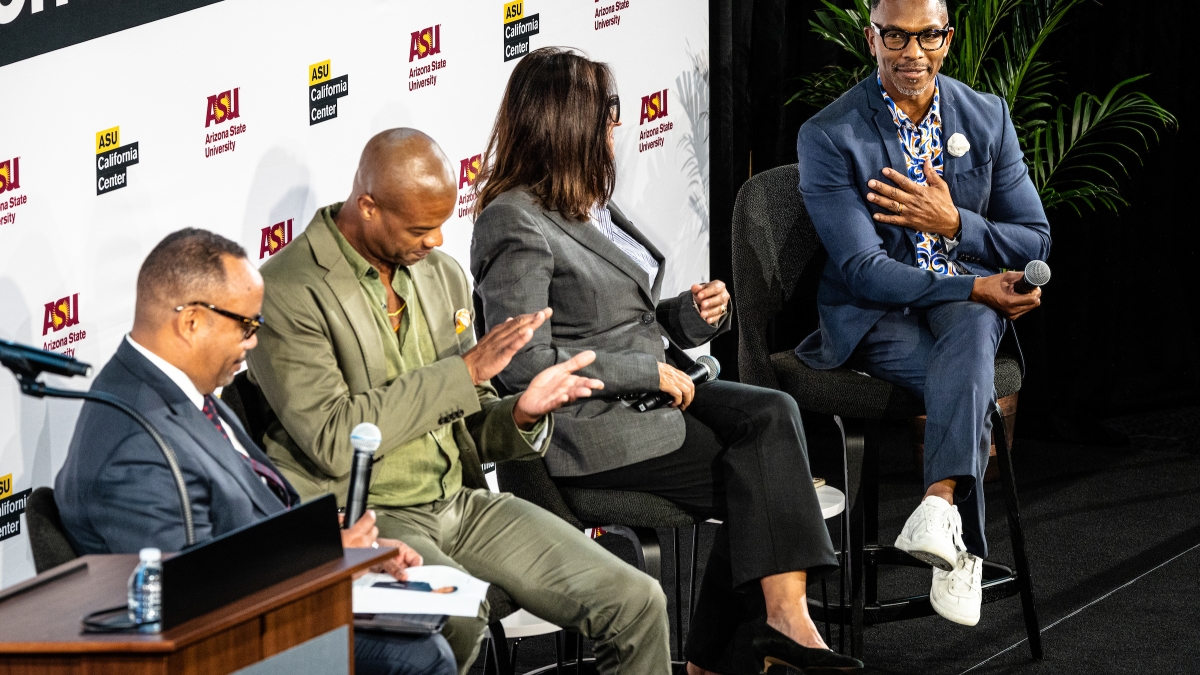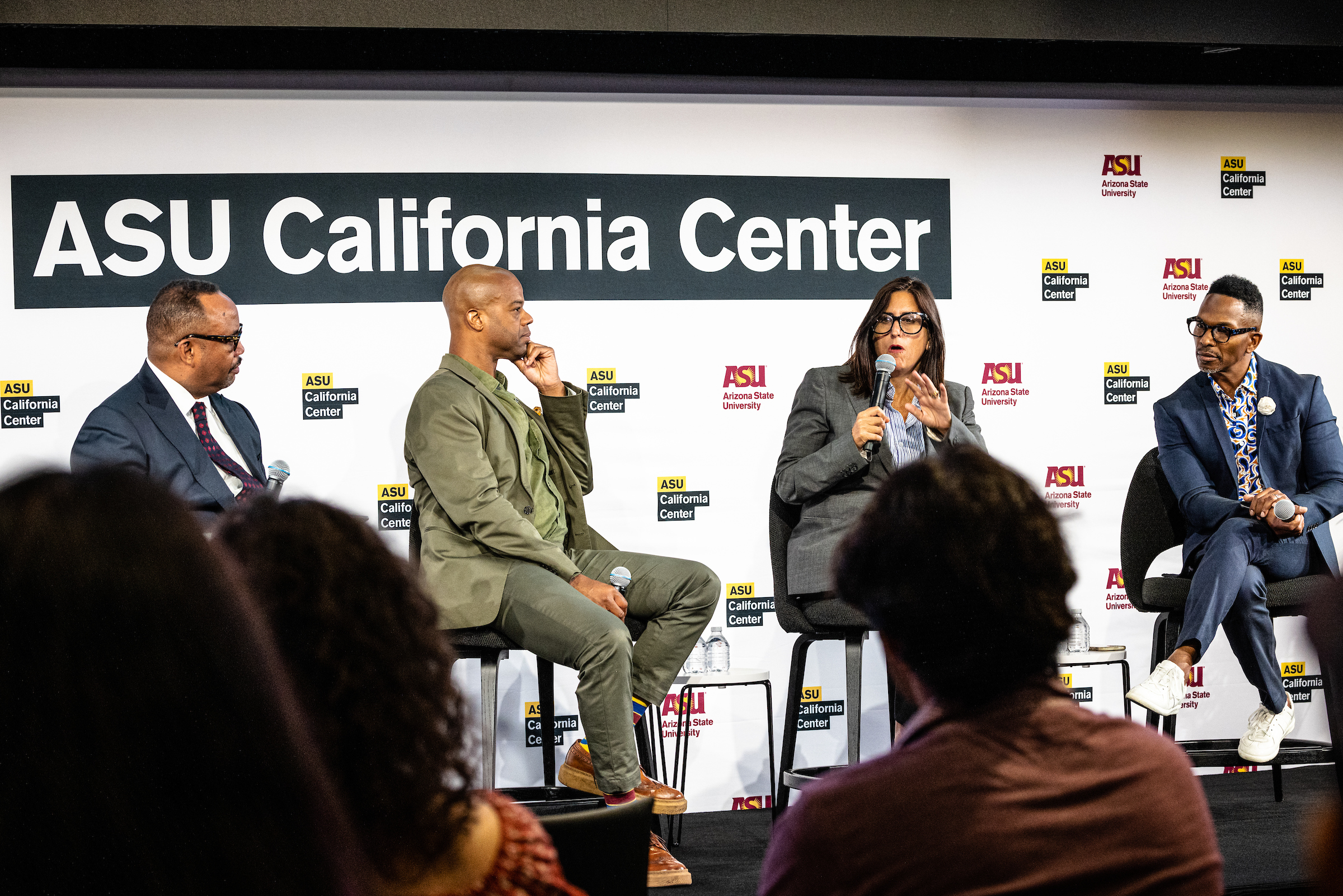Editor's note: This story is part of our coverage of a weeklong series of events to mark ASU's expansion in California at the ASU California Center in downtown Los Angeles.
When Ron Kellum graduated from the Walter Cronkite School of Journalism and Mass Communication in 1987, he was one of two African Americans in the broadcasting program.
The entire Arizona State University student body was only 1% African American.
“I remember never seeing a reflection of myself,” he said.
On Monday night, Kellum was a panelist in a program titled “Diversity, Culture and the Media,” part of a weeklong celebration of the new ASU California Center in downtown Los Angeles.
The program was moderated by Battinto Batts Jr., dean of the Cronkite School, who is a Black man.
“You’ll never know what it means for me, who graduated in 1987, to see Dr. Batts here,” Kellum said.
Batts said that the discussion on diversity in media was no accident.
“We’re here in Los Angeles, which is one of the most diverse cities on the planet. We’re in this building, the former Herald Examiner Building, owned by William Randolph Hearst, who had a questionable reputation as it relates to race and ethnicity,” he said.
Batts noted that newsrooms have not become significantly more representative since he started in the business decades ago.
“I would not be here if it was not for efforts at diversity. But since then, we’re running in place,” he said.
The lack of diversity has meant a lack of role models, according to Nonny de la Peña, the founding director of the Narrative and Emerging Media Program at ASU, a joint undertaking by The Sidney Poitier New American Film School and the Walter Cronkite School of Journalism and Mass Communication. She is the founder and CEO of Emblematic Group, a digital media company focused on immersive virtual, mixed and augmented reality.
“In technology, it’s a monoculture,” she said. “It’s one of the reasons I’m here (at ASU). I was running my company, and I would pull in an intern here or there and I was never going to really disrupt that monoculture.”
Diversity is also about perspective, said Malcolm Venable, an entertainment journalist and currently a senior writer for Shondaland.com, founded by Shonda Rhimes.
“Just because two people are of the same ethnicity or outward appearance doesn’t mean their values are the same or the way they move through the world is the same,” he said.
“You want a newsroom full of people who are of different ethnic backgrounds and heritages, but you also want diversity of perspective.”
Nonny de la Peña, ASU faculty member, Peabody winner and extended reality pioneer, speaks during the “Diversity, Culture and the Media” panel Monday at the Herald Examiner Building in Los Angeles. Walter Cronkite School of Journalism and Mass Communication Dean Battinto Batts Jr. (left) moderated the panel exploring the media's relationship with diverse communities, the evolving role of minority media organizations and the importance of an inclusive media landscape. Other panelists were Malcolm Venable (second from left), a senior staff writer at Shondaland, and Ron Kellum, a Cronkite School alum and the first African American artistic director for Cirque du Soleil. Photo by Charlie Leight/ASU News
All three panelists noted the burden that is inherent with being the “first” or the “only” in the room.
Kellum is the first African American artistic director for Cirque du Soleil.
“There are 2,000 employees at headquarters in Montreal, and there’s not one person of color who works in the headquarters. How is that happening?” he said.
“To say I’m first at this age when there have been so many pioneers before me, I get fatigued. Until there are greater numbers, we can’t make change.”
De la Peña recalled a recent business meeting with a man in the technology industry.
“I had to take an extra hour to prove again what my credentials were. That wasn’t an hour I had,” she said.
“I have to do the work day in and day out if we’re going to make changes.”
Venable has found himself the only Black person in a room full of hundreds of people at some Hollywood events.
“Being first is framed as an achievement, but we should reframe it as a failure of the organization,” he said.
“What happened to eliminate all the other qualified people?”
Venable also lamented the erasure of Latino people in Hollywood.
“It’s disgraceful,” he said. “This town is literally Spanish. There’s no excuse for it.”
The panelists decried how demand for higher profits has led to the hollowing out of local news reporting.
“We should be concerned about the decline of local news for the same reason we’re here talking about diversity — because it means there are stories not being told that would help us to understand our neighbors and understand different perspectives,” Batts said.
“The 20th-century business model of journalism is failing, but we as a society still need journalism. It shouldn’t be about the profit margins but about how many people we impact.”
Batts said he remains optimistic.
“There are lots of different voices being covered in lots of different platforms. I’m encouraged by the democratization of media. If I want to start a website or social media feed, the barrier to entry is lower than it’s ever been.”
Top photo: Ron Kellum (right), a Cronkite School alum and producer and director, speaks in the “Diversity, Culture and the Media” panel on Monday evening, Oct. 3, during the grand opening week for the ASU California Center. The event also featured (from left) Cronkite School Dean Battinto Batts Jr. as moderator and panelists Malcolm Venable, a senior staff writer at Shondaland.com, and Nonny de la Peña, a Peabody winner, ASU program director and and extended reality pioneer. Photo by Charlie Leight/ASU News
More Law, journalism and politics

Exhibit uses rare memorabilia to illustrate evolution of US presidential campaigns
After one of the most contentious elections in history, a new museum exhibit offers a historical perspective on the centuries-old American process.“We The People! Electing the American President” had…

TechTainment conference explores the crossroads of law, technology, entertainment
What protections do writers, actors, producers and others have from AI? Will changing laws around name, image and likeness (NIL) eliminate less lucrative college sports programs?And what does…

How to watch an election
Every election night, adrenaline pumps through newsrooms across the country as journalists take the pulse of democracy. We gathered three veteran reporters — each of them faculty at the Walter…

